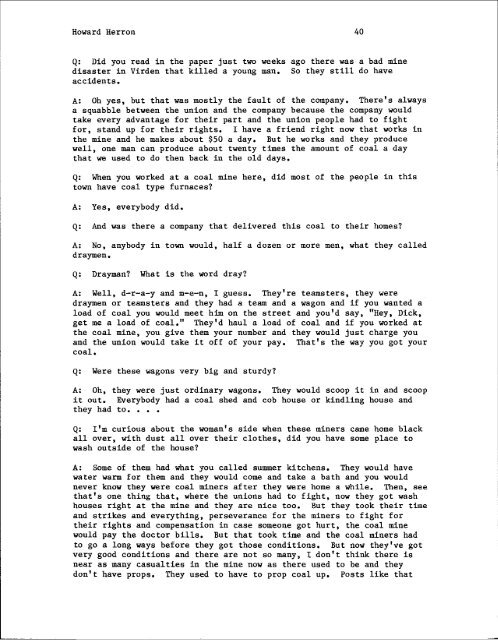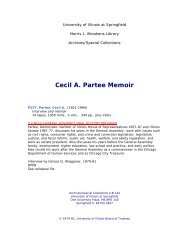Howard Herron Memoir - University of Illinois Springfield
Howard Herron Memoir - University of Illinois Springfield
Howard Herron Memoir - University of Illinois Springfield
Create successful ePaper yourself
Turn your PDF publications into a flip-book with our unique Google optimized e-Paper software.
1 <strong>Howard</strong> <strong>Herron</strong> 40<br />
Q: Did you read in the paper just two weeks ago there was a bad mine<br />
disaster in Virden that killed a young man. So they still do have<br />
accidents.<br />
A: Oh yes, but that was mostly the fault <strong>of</strong> the company. There's always<br />
a squabble between the union and the company because the company would<br />
take every advantage for their part and the union people had to Eight<br />
for, stand up for their rights. I have a friend right now that works in<br />
the mine and he makes about $50 a day. But he works and they produce<br />
well, one man can produce about twenty times the amount <strong>of</strong> coal a day<br />
that we used to do then back in the old days.<br />
Q: When you worked at a coal mine here, did most <strong>of</strong> the people in this<br />
town have coal type furnaces?<br />
A: Yes, everybody did.<br />
Q: And was there a company that delivered this coal to their homes?<br />
A: No, anybody in town would, half a dozen or more men, what they called<br />
draymen.<br />
Q: Drayman? What is the word dray?<br />
A: Well, d-r-a-y and m-e-n, I guess. They're teamsters, they were<br />
draymen or teamsters and they had a team and a wagon and if you wanted a<br />
load <strong>of</strong> coal you would meet him on the street and you'd say, "Hey, Dick,<br />
get me a load <strong>of</strong> coal." They'd haul a load <strong>of</strong> coal and if you worked at<br />
the coal mine, you give them your number and they would just charge you<br />
and the union would take it <strong>of</strong>f <strong>of</strong> your pay. That's the way you got your<br />
coal.<br />
Q: Were these wagons very big and sturdy?<br />
A: Oh, they were just ordinary wagons. They would scoop it in and scoop<br />
it out. Everybody had a coal shed and cob house or kindling house and<br />
they had to. . . .<br />
Q: I'm curious about the woman's side when these miners came home black<br />
all over, with dust all over their clothes, did you have some place to<br />
wash outside <strong>of</strong> the house?<br />
A: Some <strong>of</strong> them had what you called summer kitchens. They would have<br />
water warm for them and they would come and take a bath and you would<br />
never know they were coal miners after they were home a while. Then, see<br />
that's one thing that, where the unions had to fight, now they got wash<br />
houses right at the mine and they are nice too. But they took their time<br />
and strikes and everything, perseverance for the miners to fight for<br />
their rights and compensation in case someone got hurt, the coal mine<br />
would pay the doctor bills. But that took time and the coal miners had<br />
to go a long ways before they got those conditions. But now they've got<br />
very good conditions and there are not so many, I don't think there is<br />
near as many casualties in the mine now as there used to be and they<br />
don't have props. They used to have to prop coal up. Posts like that
















